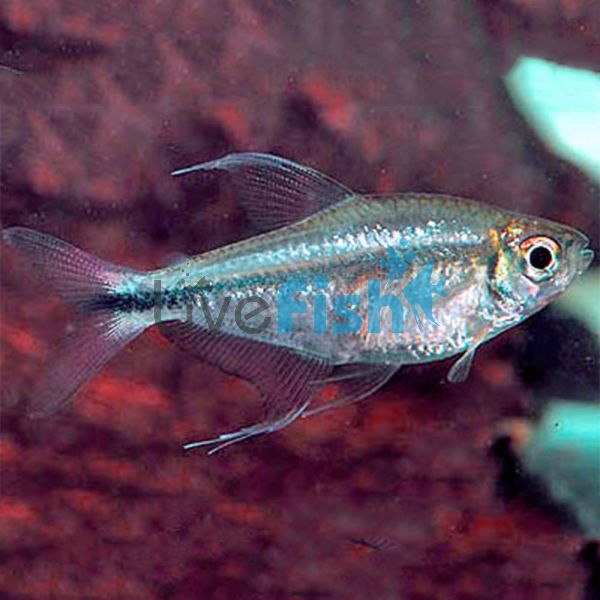Phoenix Tetra 3cm
The Phoenix Tetra is a stunning and underrated schooling fish from South America. This fish is usually overshadowed by the more common species like neons or cardinals but will make for a great, slightly larger growing and shimmering option for a community or planted aquarium. Their delicate look, peaceful nature, and active behaviour really do make them the perfect fish to add some volume to a system.
- Buy 5 for $18.81 each and save 20%
- Buy 10 for $16.46 each and save 30%
Phoenix Tetra
The Phoenix tetra is a stunning and underrated schooling fish that from South America. This fish is usually overshadowed by the more common species like neons or cardinals but will make for a great, slightly larger growing and shimmering option for a community or planted aquarium. Their delicate look, peaceful nature and active behaviour really does make them the perfect fish to add some volume into a system.
The adult phoenix tetra only reaches around 4-5 cm in length and can be recognised by it mix of metallic body colours that include blue, silver, platinum white and golf. These metallic colours are essentially present all through the body which makes it especially stunning when the fish reflect light when they swim. The fins are also a true stand out feature of these fish, they are all tipped with white and naturally flow almost resembling a man-made longfin species. The main contrast is on the tail fin where they have a streak of black that is paralleled with metallic blue. These phoenix tetras are similar to other long fin, oval body species like white fin ornate, bleeding heart and black widow tetras but are very different in their coloration which makes them a great candidate for blackwater systems as well.
Phoenix tetras are egg scatterers and relatively easy to breed. After a courtship dance, the female scatters her eggs among fine-leaved plants, which are then fertilised by the male. There is no parental care provided, and removing the adults after spawning is advised to prevent egg predation. The male boasts a more slender and intensely coloured body compared to the female, and also has longer fins. The best method of success in breeding would be to put a single male with a pair of females into a 40-litre aquarium with a spawning mop or java moss. After spawn the parents can be taken out and the fry can be raised.
Tank Recommendations for your Phoenix Tetra
Phoenix tetras are best housed in a densely planted 70 litre or larger tank with plenty of swimming space. Since these are a mid-water fish they really are not fussed with the hardscape or substrate choices in an aquarium. A blackwater, hardscape only or even planted aquarium will be fine however they would stand out best in the latter option. They prefer soft, slightly acidic water with temperatures between 23 - 28°C and a pH of 5.5 - 7.0. Providing a darker background and substrate can help intensify their colours as well.
Suitable Tank Buddies
Phoenix tetras are peaceful and fare well with a variety of small, non-aggressive tankmates.
Usually Compatible
Other small tetras, rasboras, dwarf cichlids, peaceful barbs, Corydoras, and small peaceful loaches.
Sometimes Compatible
Gouramis and Angelfish. While generally peaceful, these species can sometimes show territorial behaviour.
Rarely Compatible
Aggressive, predatory, or large species that can easily stress, harm, or eat the small Phoenix tetras.
Feeding your Phoenix Tetra
Phoenix tetras are a very easy fish to feed. They will take a wide range of pellets, flakes and frozen foods. Just like any fish though they should be fed a varied diet with a mix of different foods.
The ideal diet would be a good quality micro slow sinking pellet or crushed flake, supplemented with frozen bloodworms or black worms or even live foods like baby brine shrimp or micro worms.
| Scientific Name | Hemigrammus Filamentosus |
|---|---|
| Care Level | Easy |
| Common Names | Phoenix Tetra |
| Diet | Omnivore |
| Fish Family | Characidae |
| Lifespan (years) | 5 |
| Max. Length (cm) | 4 |
| Min. Tank Volume (l) | 70 |
| Origin | South America |
| Reef Safe | Yes |
| Sociability | Peaceful |
| Venomous | No |
| Water Conditions | 24-26° C, pH 6.0-7.0 |




